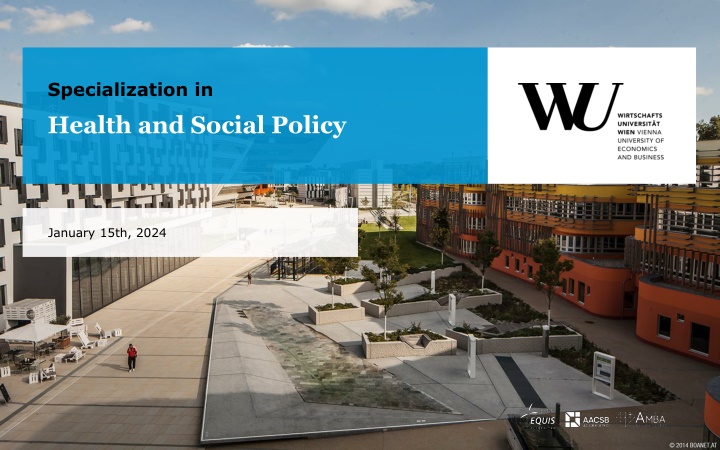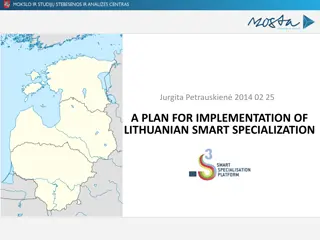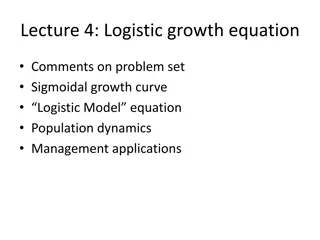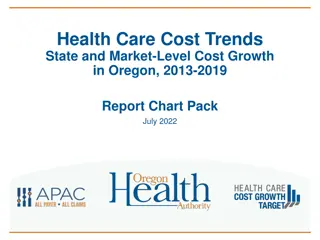
Specialization in Health and Social Policy - Professional Preparation for Growth Sector Challenges
In Europe, the health and social care sector plays a crucial role in both public and private realms, with significant expenditure from GDP. This specialization equips students with interdisciplinary skills to address the complexities of health and social policies in a rapidly evolving landscape. With a focus on interactive learning and international perspectives, students engage with key topics such as public and private healthcare economics, social policy evaluation, and more. The program offers a diverse range of courses to develop a deep understanding of the interconnected nature of health services provision, preparing students for impactful roles in this vital sector.
Download Presentation

Please find below an Image/Link to download the presentation.
The content on the website is provided AS IS for your information and personal use only. It may not be sold, licensed, or shared on other websites without obtaining consent from the author. If you encounter any issues during the download, it is possible that the publisher has removed the file from their server.
You are allowed to download the files provided on this website for personal or commercial use, subject to the condition that they are used lawfully. All files are the property of their respective owners.
The content on the website is provided AS IS for your information and personal use only. It may not be sold, licensed, or shared on other websites without obtaining consent from the author.
E N D
Presentation Transcript
Specialization in Health and Social Policy January 15th, 2024
Teaching team Institute for Social Policy Marcel Bilger (also Health Economics and Policy Group) Mark Golboyz Sophie Guthmuller (also Health Economics and Policy Group) August sterle Ulrike Schneider Viktoria Szenkur k (also Health Economics and Policy Group) SEITE 2
Why a specialization in Health and Social Policy? An important share of the working population in Europe is in health and social care, both in public and in private sectors In the European Union, public expenditure on health and social policies accounts for almost 30% of GDP Health and social policies include pensions, health care, education, child care, unemployment, poverty, etc The public sector, nonprofit organizations, the traditional market sector and families are closely interlinked in the provision of health services and their financing The specialization is designed to prepare students for the specific, interdisciplinary professional challenges in this growth sector SEITE 3
Key facts about the specialization interdisciplinary international interactive For students in BBE, BW, IBW and WIRE 30 students per semester 5 PI courses for a total of 20 ECTS credits All courses are taught in English SEITE 4
Courses offered in the specialization Five PI courses 1. Introduction to Health and Social Policy 2. Economics and Policy of the Public Healthcare Industry 3. Economics and Policy of the Private Healthcare Industry 4. International and Transnational Social Policy 5. Social Policy Evaluation Flexible structure The teaching material of each course is complementary but not interdependent Only the registration to Introduction to Health and Social Policy is required to register to any other course All 5 courses are offered each semester Courses 4 & 5 are regularly doubled to provide lower class sizes and more interaction SEITE 5
Interlinked social policies, example 1 Shortage of hospital beds Build larger hospitals? Air-conditioned tents in Changi General Hospital, Singapore Source: The Straits Times, Jan 8th, 2014 Singapore General Hospital in 2020 FUSSZEILE SEITE 6
Interlinked social policies, example 2 Covid-19 pandemic Policies affected Health Long-term care Public health Unemployment insurance Poverty reduction Education Family policy and many more in all sectors of the economy 880 beds set up at Messe Wien in March 2020 Source: Stadt Wien FUSSZEILE SEITE 7
Courses 1 Introduction to Health and Social Policy Topics covered social policy, social welfare and the welfare state o objectives, principles, actors, policies social risk and (social) insurance equity: concepts, issues and policies comparative welfare state analysis subfields of social policy o poverty o pension o health and long-term care o labor market policies SEITE 8 FUSSZEILE
Courses 2 & 3 2 perspectives on health economics and policy Public healthcare industry Private healthcare industry 1. Introduction 2. Production and demand for health 3. Social health insurance 4. Public provision of healthcare 5. Healthcare labor markets 6. Economic epidemiology 7. Regulation of unhealthy goods and behaviors 1. Introduction 2. Healthcare consumers 3. Private health insurers 4. Hospitals 5. Physicians 6. Pharmaceutical industry 7. Behavioral health economics SEITE 9 FUSSZEILE
Course 4 International and Transnational Social Policy Objectives Key questions How do health and social policies compare? How social policy travels? What is the role of international organizations and cross-border learning? How is the EU impacting national health and social policies and individual social security in Europe? How, why and by whom is medical care accessed and used across borders? What are the social rights of migrants? present a European and global comparative perspective on health and social policies and welfare state development analyze supranational social policy in the EU and its interactions with national social policies as well as the role of international organizations discuss formal and informal transnational social security SEITE 10 FUSSZEILE
Course 5 Social Policy Evaluation Objectives Examples of evaluation questions present a comprehensive framework to evaluate health and social policies. introduce key concepts and methods for vidence-based analyses of poliecies to inform decision- making: o Taking into account different stakeholder perspectives; policy maker, the public sector, the private sector, the individuals. o Based on qualitative, quantitative and mixed methods o At the firm, city, regional, country, or global level. develop critical appraisal skills Relevance: Do the objectives of the program Gesunde Bezirke meet the needs and the expectations of the inhabitants of the districts in Vienna? Coherence: How do the actions to improve healthier diets support or hinder progress in access to affordable food? Effectiveness: Do the new toy safety requirements in Europe, decrease the number of toy related injuries? Efficiency: Should more funds be awarded to the construction of social housing or to a social housing allocation, to improve access to quality housing of poor households in Europe? Acceptability/acceptance: What influences the public acceptance of the current Covid-19 vaccine policy? SEITE 11 FUSSZEILE
Policy and Evaluation Criteria Effects Relevance External factors Other policies Impacts Needs Coherence Results Objectives Inputs Activities Outputs Policy Efficiency Effectiveness SEITE 12
Admission to the specialization Admission to the specialization Health and Social Policy in the summer term 2024 requires the following steps: Register for the course 5378 Access to Specialization: Health and Social Policy Registration is possible between February 1st, 2024 and February 4th, 2024 using LPIS. You will get the task to write a motivational letter in LEARN as soon as you've enrolled Submission dates: between February 1st, 2024 and February 4th, 2024. please note that you don't have much time, so enroll in LPIS as early as possible We will inform accepted students no later than February 19th, 2024. Registration for courses of the specialization starts on February 22, 2024, and ends on February 25, 2024. You will have to register to at least Course I during your first semester SEITE 13
Motivational letter Explain why you are applying to our specialization Discuss a current issue in health and social policy or future challenges that we might have to face You can address an issue on local, national or international level You can focus on pressing issues high on the political agenda, but you can also address issues that are often widely neglected Tell us about how you perceive the chosen issue or challenge and what interests you about it Make an interdisciplinary case by giving arguments relating to at least two of the following disciplines: Economics, Social Sciences, Business Administration, and Law SEITE 14
Motivational letter, contd This is a motivational letter, so references to the literature are not needed. Nevertheless, please note the following formalities: Heading: This should include your name, student ID number, Specialization Health and Social Policy: Motivational Letter Length: 400-500 words (without heading) Submission: Please upload a pdf-file titled lastname_firstname_studentIDnumber to LEARN (between February 1st, 2024 and February 4th, 2024). SEITE 15
Many thanks for your attention Further information can be found on the webpage of the Institute for Social Policy: https://www.wu.ac.at/en/sozialpolitik/teaching/healthandsocialpolicy/ Any question? Feel free to write to us! hsp@wu.ac.at SEITE 16 FUSSZEILE






















